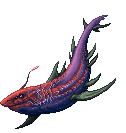Viewing TtjOQ

Father: Unknown
Unknown Pedigree
Hardiness: 43
Appearance: 4
Emerged: 17:30 26.04.2023
Matured: 2:43 29.04.2023
The extreme dimorphism of Luma Mordos is possibly a result of their deep-sea habitat, where food is scarce and predators must be strong to survive. Large and muscular in build, female Luma Mordos are extremely territorial and will allow only males to enter their domain. Males use their jaws to attach to their mate when not hunting to avoid being separated from her; older females often carry several mates around. Their soft luminescence is created by a symbiotic relationship with bioluminescent bacteria and used to attract prey. Females are capable of hunting much larger prey than the much smaller males, and when their quarry draws close enough, they will lunge forward with a burst of speed to catch it in their powerful jaws. They can be quite fast when the need arises, though most of the time they move slowly to conserve energy. Males are swifter and more agile, and they will fight amongst themselves over scraps from a female’s kill.
The creatures that dwell in this rather desolate world still display some diversity in appearance, eating habits, and social behavior. Whether they have fur or feathers, skin or scales, their unique genetic makeup allows for a variety of colors and markings within each species. Despite limitations in food sources, herbivores, omnivores, and carnivores are all present in the food chain, and each species requires specialized care within a laboratory. Although the artificial setting of housing units and breeding pods precludes most opportunities to study true interspecific behavior, the interactions within and between species has been studied extensively in the wilderness by scientists daring enough to venture beyond the outpost’s walls.
